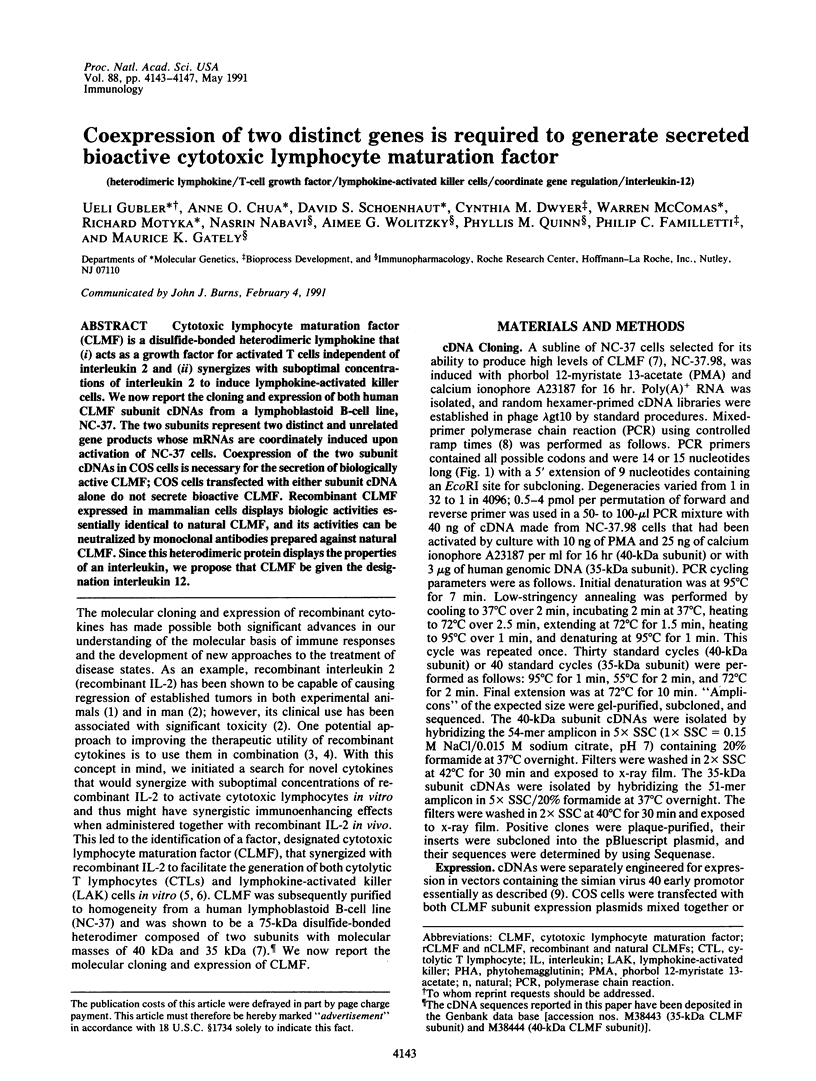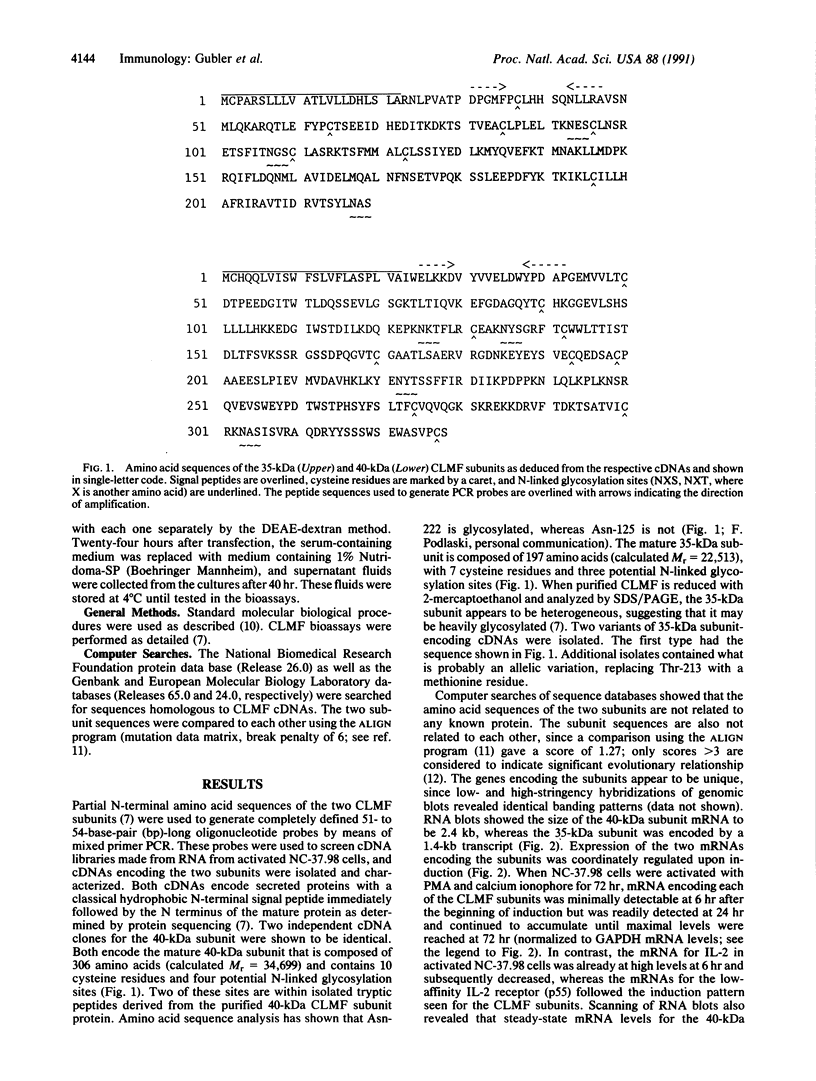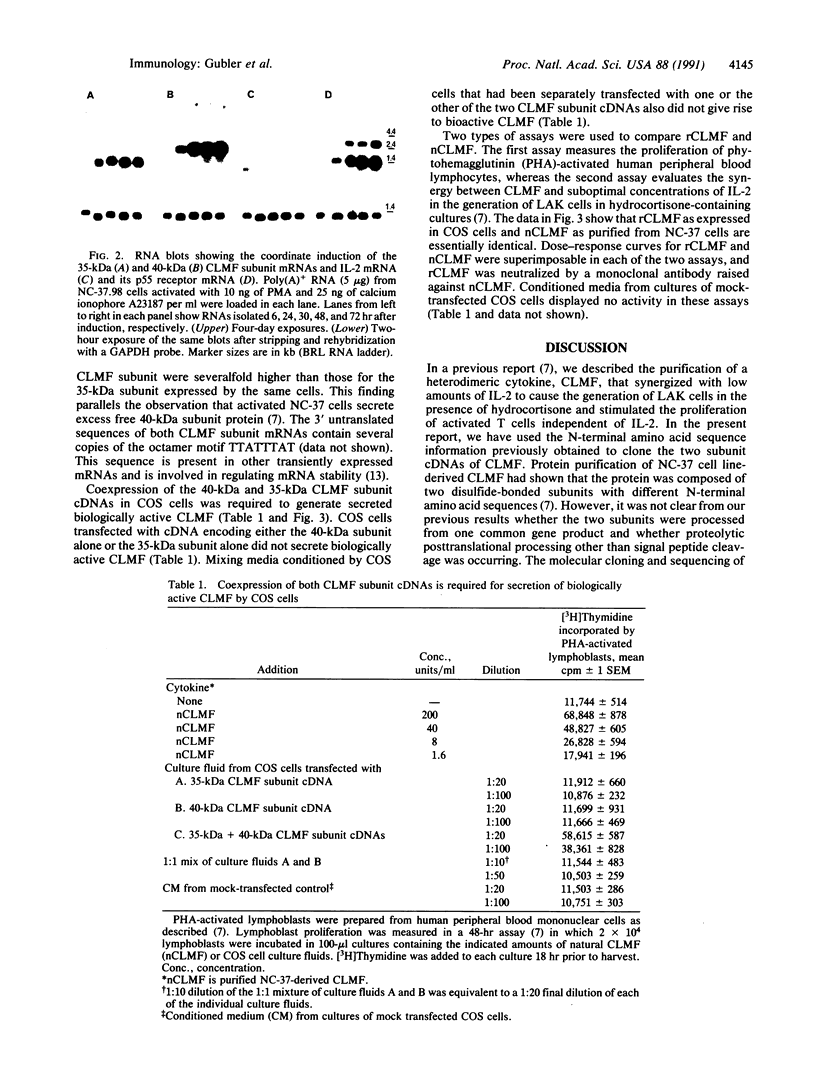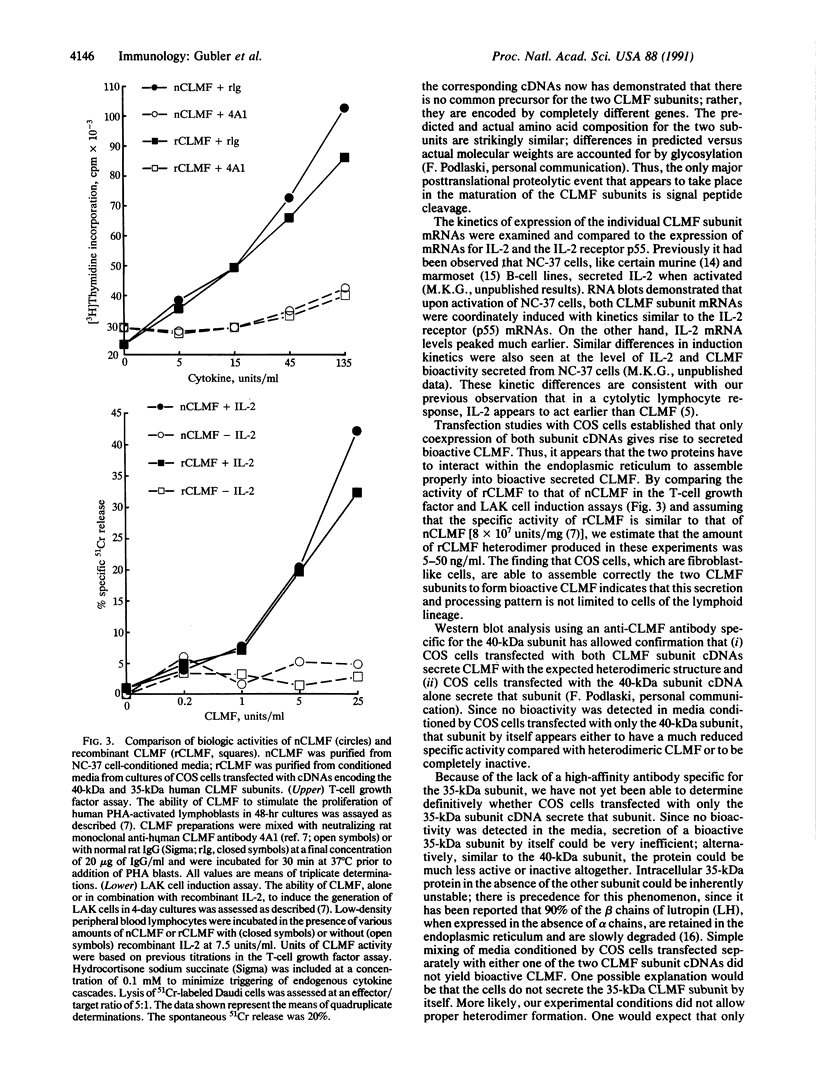Abstract
Cytotoxic lymphocyte maturation factor (CLMF) is a disulfide-bonded heterodimeric lymphokine that (i) acts as a growth factor for activated T cells independent of interleukin 2 and (ii) synergizes with suboptimal concentrations of interleukin 2 to induce lymphokine-activated killer cells. We now report the cloning and expression of both human CLMF subunit cDNAs from a lymphoblastoid B-cell line, NC-37. The two subunits represent two distinct and unrelated gene products whose mRNAs are coordinately induced upon activation of NC-37 cells. Coexpression of the two subunit cDNAs in COS cells is necessary for the secretion of biologically active CLMF; COS cells transfected with either subunit cDNA alone do not secrete bioactive CLMF. Recombinant CLMF expressed in mammalian cells displays biologic activities essentially identical to natural CLMF, and its activities can be neutralized by monoclonal antibodies prepared against natural CLMF. Since this heterodimeric protein displays the properties of an interleukin, we propose that CLMF be given the designation interleukin 12.
Full text
PDF




Images in this article
Selected References
These references are in PubMed. This may not be the complete list of references from this article.
- Brent L. H., Miyawaki T., Everson M. P., Butler J. L. Interleukin 2 production by a marmoset B cell line. Eur J Immunol. 1990 May;20(5):1125–1129. doi: 10.1002/eji.1830200527. [DOI] [PubMed] [Google Scholar]
- Corless C. L., Matzuk M. M., Ramabhadran T. V., Krichevsky A., Boime I. Gonadotropin beta subunits determine the rate of assembly and the oligosaccharide processing of hormone dimer in transfected cells. J Cell Biol. 1987 May;104(5):1173–1181. doi: 10.1083/jcb.104.5.1173. [DOI] [PMC free article] [PubMed] [Google Scholar]
- Cullen B. R. Use of eukaryotic expression technology in the functional analysis of cloned genes. Methods Enzymol. 1987;152:684–704. doi: 10.1016/0076-6879(87)52074-2. [DOI] [PubMed] [Google Scholar]
- Dayhoff M. O., Barker W. C., Hunt L. T. Establishing homologies in protein sequences. Methods Enzymol. 1983;91:524–545. doi: 10.1016/s0076-6879(83)91049-2. [DOI] [PubMed] [Google Scholar]
- Gately M. K., Wilson D. E., Wong H. L. Synergy between recombinant interleukin 2 (rIL 2) and IL 2-depleted lymphokine-containing supernatants in facilitating allogeneic human cytolytic T lymphocyte responses in vitro. J Immunol. 1986 Feb 15;136(4):1274–1282. [PubMed] [Google Scholar]
- Iigo M., Sakurai M., Tamura T., Saijo N., Hoshi A. In vivo antitumor activity of multiple injections of recombinant interleukin 2, alone and in combination with three different types of recombinant interferon, on various syngeneic murine tumors. Cancer Res. 1988 Jan 15;48(2):260–264. [PubMed] [Google Scholar]
- Kobayashi M., Fitz L., Ryan M., Hewick R. M., Clark S. C., Chan S., Loudon R., Sherman F., Perussia B., Trinchieri G. Identification and purification of natural killer cell stimulatory factor (NKSF), a cytokine with multiple biologic effects on human lymphocytes. J Exp Med. 1989 Sep 1;170(3):827–845. doi: 10.1084/jem.170.3.827. [DOI] [PMC free article] [PubMed] [Google Scholar]
- Liu Y., Müllbacher A. Activated B cells can deliver help for the in vitro generation of antiviral cytotoxic T cells. Proc Natl Acad Sci U S A. 1989 Jun;86(12):4629–4633. doi: 10.1073/pnas.86.12.4629. [DOI] [PMC free article] [PubMed] [Google Scholar]
- Rosenberg S. A., Lotze M. T., Muul L. M., Leitman S., Chang A. E., Ettinghausen S. E., Matory Y. L., Skibber J. M., Shiloni E., Vetto J. T. Observations on the systemic administration of autologous lymphokine-activated killer cells and recombinant interleukin-2 to patients with metastatic cancer. N Engl J Med. 1985 Dec 5;313(23):1485–1492. doi: 10.1056/NEJM198512053132327. [DOI] [PubMed] [Google Scholar]
- Rosenberg S. A., Mulé J. J., Spiess P. J., Reichert C. M., Schwarz S. L. Regression of established pulmonary metastases and subcutaneous tumor mediated by the systemic administration of high-dose recombinant interleukin 2. J Exp Med. 1985 May 1;161(5):1169–1188. doi: 10.1084/jem.161.5.1169. [DOI] [PMC free article] [PubMed] [Google Scholar]
- Shaw G., Kamen R. A conserved AU sequence from the 3' untranslated region of GM-CSF mRNA mediates selective mRNA degradation. Cell. 1986 Aug 29;46(5):659–667. doi: 10.1016/0092-8674(86)90341-7. [DOI] [PubMed] [Google Scholar]
- Stern A. S., Podlaski F. J., Hulmes J. D., Pan Y. C., Quinn P. M., Wolitzky A. G., Familletti P. C., Stremlo D. L., Truitt T., Chizzonite R. Purification to homogeneity and partial characterization of cytotoxic lymphocyte maturation factor from human B-lymphoblastoid cells. Proc Natl Acad Sci U S A. 1990 Sep;87(17):6808–6812. doi: 10.1073/pnas.87.17.6808. [DOI] [PMC free article] [PubMed] [Google Scholar]
- Taira S., Matsui M., Hayakawa K., Yokoyama T., Nariuchi H. Interleukin secretion by B cell lines and splenic B cells stimulated with calcium ionophore and phorbol ester. J Immunol. 1987 Nov 1;139(9):2957–2964. [PubMed] [Google Scholar]
- Winkelhake J. L., Stampfl S., Zimmerman R. J. Synergistic effects of combination therapy with human recombinant interleukin-2 and tumor necrosis factor in murine tumor models. Cancer Res. 1987 Aug 1;47(15):3948–3953. [PubMed] [Google Scholar]
- Wong H. L., Wilson D. E., Jenson J. C., Familletti P. C., Stremlo D. L., Gately M. K. Characterization of a factor(s) which synergizes with recombinant interleukin 2 in promoting allogeneic human cytolytic T-lymphocyte responses in vitro. Cell Immunol. 1988 Jan;111(1):39–54. doi: 10.1016/0008-8749(88)90049-4. [DOI] [PubMed] [Google Scholar]



